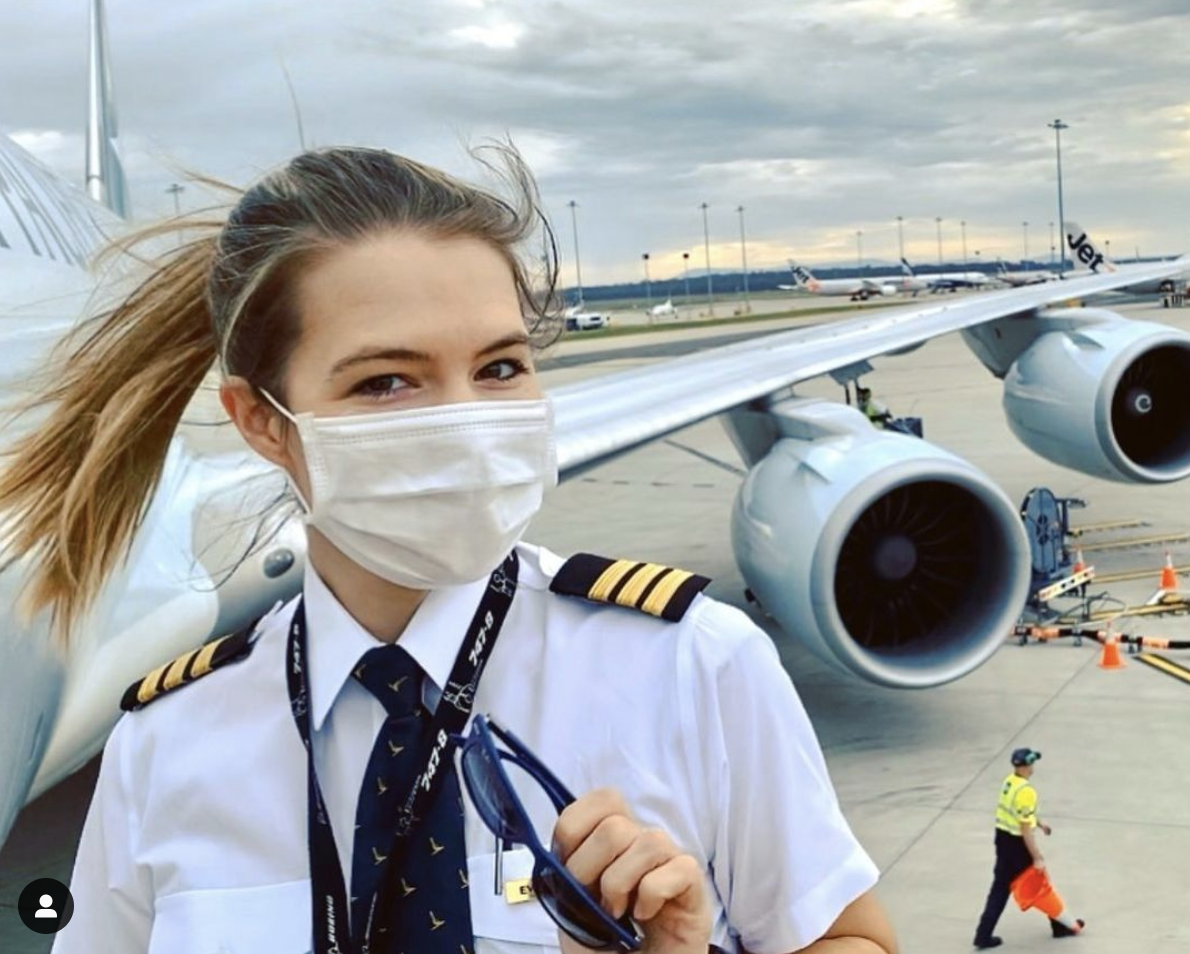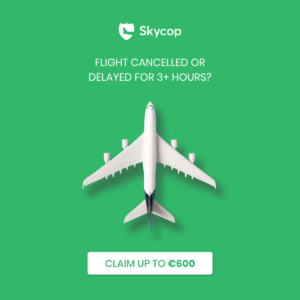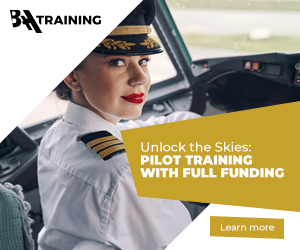I love Eva's story and follow her on social media. There is something very naturally engaging about her. Her aviation career was affected by the downturn in aviation industry, it took her 2.5 years to get her first pilot job after obtaining pilot license. Here Eva Claire Marseille tells her story and share some inspiration with us.
1. Give us your background.
My name is Eva Claire Marseille, and I am from Haarlem, The Netherlands. I currently live in Hong Kong with my Dutch boyfriend Brian, who is a travel guide, art and drama teacher and videographer. I am based in Hong Kong in my current job as a Boeing 747 pilot.
“I was not sure what I wanted with my life when I was younger, but I did dream of a ‘big adventurous life’. My mum raised me telling me over and over that I could accomplish anything I would set my mind to. So I dared to dream big. ”
In high school I had a talent for languages and it seemed natural that I would study literature. I aspired to be a journalist and my ideal lifestyle was to live abroad, travel a lot, never work nine to five and meet lots of interesting people. I graduated in journalism and modern Dutch Literature in 2008. I had by then also passed the assessment of a Flight School, which brings us to the next question.
2. What made you choose to learn flying and become a pilot?
Becoming a pilot was never my childhood dream. While studying in University somehow the aviation industry got my attention, as I started to doubt where I was heading with my journalism studies. I was convinced that pilots had the most amazing job I could think of. I visited an information day of a flight school and it turned out I met all the requirements to apply. The course sounded so interesting and fascinating, studying meteorology and principles of flight and learning to fly abroad in small airplanes. I decided right then and there that I needed to go for it and that decision turned out the best decision in my life. I passed the assessments and trained to obtain an Airline Transport Pilot License. I found where I belonged, it is truly where my heart is. It was challenging but it was also my passion, so I enjoyed devoting all my time and energy to my goal of becoming a pilot.
3. Tell me the early struggle and challenges you faced as a student pilot, from a female perspective?
I joined the NLS (Nationale Luchtvaartschool, or ‘Dutch National Flight School’) in October 2008. I was the only girl in a class of 24, until then I had never given it a thought that I would enter a male dominated profession. My classmates were great and I really felt part of the group. I find it difficult to add a female perspective to this question, as I think I had the exact same struggles as all student pilots. There is the financial struggle, the struggle of the unstable job market (I was in the first month of my ATPL course when the Global Financial Crisis started) and the pressure to perform well in every flight and every exam.
4. How many airplane types have you flown?
I trained on the Piper Archer and the TB20 (single engine) and the Seneca V (Multi engine). After graduating I regularly rented an a Single Engine Airplane, usually the Piper Archer or the Cessna 172, to keep making flight hours when I had no pilot job yet. I also flew in South Africa in a Cessna 172 on bush wheels, which was great fun.
My first airline job was as a First Officer on the Boeing 737-800. I flew the B737 for several years; I was based in Rome and later in Barcelona and flew passengers within Europe, usually 4 flights per day. I currently fly the Boeing 747-8F and the Boeing 747-400ERF, based in Hong Kong. One year ago I had my first rotary-wing flying experience, when a friend arranged a helicopter flying lesson for me in a Robinson R-22 in Alaska. That gave such a feeling of freedom!
5. How did you land that first job and eventually go on to fly the Boeing 747 freighter?
The job market was challenging in 2011/2012 and it took some time before landing a job. I worked on the ground in flight operations at the Dutch airline Martinair, while I applied everywhere.
“My whole life at that time revolved around getting a pilot job in an airline. Finally I was invited for an assessment at a European low cost airline.”
Two and a half years after graduating flight school, I obtained my first job as a Boeing 737 First Officer. I was based in Rome and Barcelona and was logging 900 flight hours every year. I applied for my current job when I had several years of experience. It was a requirement to have 3000 hours of ‘jet time’ for the vacancy of Boeing 747 or Airbus 330 Direct Entry First Officer, at my current airline.
When I got invited for the two days of assessments in Hong Kong, I did everything I could to be fully prepared.
“When I was asked during the interview if I had a preference for a type (A330 or B747) I’m sure my strong wish to fly the Jumbo came across, I was lucky to get assigned the B747 when I got the job. I then had to do a ‘conversion course’ to obtain a Boeing 747 rating.”
This course was provided by the airline (If one is interested, I wrote an article about the preparation for my Boeing 747 assessment here).
6. If you had a chance to start all over again, would you again choose to be a pilot?
Yes, absolutely. Flying during the COVID pandemic, which comes with many restrictions, is very challenging, but I am incredibly grateful that I still get to fly. I would also still study something else before going to Flight School. Going to University, prior to Flight School, gave me the chance to develop myself and gain skills outside of aviation.
A major challenge in the pilot career is the instability of the industry, which has become very clear now during COVID. The industry has been hugely affected in the last two decades first by September 11th 2001, then the Global Financial Crisis (as mentioned it took me 2.5 years to get my first pilot job after obtaining my license) and now COVID. It’s a fragile industry, with huge ups and downs in the job market. It is more normal to lose your job at least once at some time during your career, then to never experience such an event. A job loss for a pilot, usually comes with a move as well. This is challenging for some, the profession has a big effect on a person's life, lifestyle and the person's family. I strongly suggest all aspiring future pilots to have a back-up plan.
7. Please mention one or two special aviation memories of yours.
The moment when I passed my initial line check in 2013 on the Boeing 737-800, my previous airplane type. It was in my first job flying passengers for a major European airline. Passing this check meant that the training phase, of many hours of studying, simulator flights and flying with training captains, was over. I would now just come to work to operate on the line as a First Officer. I already had my pilot license for over 2 years at this point and of course I was already a pilot when I got my license. But to pass that final check and now be responsible every day for hundreds of passengers, that to me marked the start of my pilot career. It was also a huge relief after not being employed as a pilot, working in flight operations for several years prior to landing my first job. Years where I sometimes wondered if I would ever work in the flight deck of a commercial airline.
8. Any advice or wise words to future female aviators?
The same as to future male aviators; do your research, have a back-up plan and if it really resonates with you then go for it! Keep in mind that the profession is changing; for example in about 2 to 3 decades it is very much a possibility to see single-pilot airline operations, with assistance from a ground controller.
9. How can women be more accepted in a male dominated pilot industry?
I think the hard work has been done in the generations before us, female pilots of today are no longer pioneers in the industry.
“I never experienced that being female was either an advantage or a disadvantage in my job as an airline pilot.”
“When you look at the statistics, and note that only about 5% of airline pilots is female, yes we are a minority, but not a novelty.”
These days there are a lot of female pilots visible on social media. This is good in my opinion! Because you can’t be what you can’t see. I have shared my life as a pilot for many years now on my Instagram account, via this platform I have reached many young women. I am in touch with a lot of them, some of them were inspired to choose for a career in aviation as well. As an example, I met up with a young girl last year who was about to start her flight training. She had been following my Instagram for some time and she said that she wanted to thank me for what I had done. She revealed to me that her father is actually an airline Captain, but with somewhat old fashioned ideas about suitable jobs for women. She said if it was not for me, she would never have thought she could become a pilot. This encounter showed me that it is really important to have female role models out there.
10. Is there any other dream airplane you would like to fly?
I have one career wish, which is to be a Boeing 747 Captain one day; so I hope to keep flying the Boeing 747 till I can make this happen. But in my current airline the opportunity for a Captain upgrade only comes after about 12 to 14 years of seniority. One never knows what the future holds and I am definitely flexible and not set on this scenario. In the end it is fun to experience different airplanes and types of operation, also to enjoy life in different countries. I quite like the thought of corporate flying in a business jet some day, or perhaps going back to short haul flying would appeal to me as well. I am fond of the MD11, but I think the Boeing 747 is my ultimate number one. Flying her is definitely a dream come true.
Follow Eva on her flying adventures @Flywitheva (Instagram) and her blog.
If you or someone you know has a good aviation story or career to tell, please contact me for an interview.




